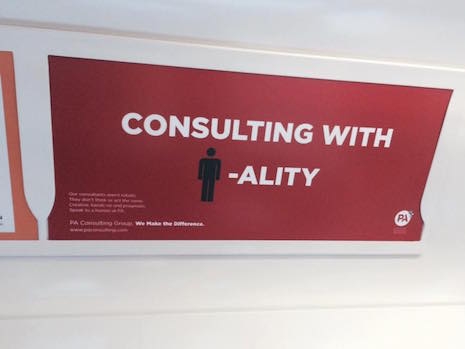
Mark Fisher is a lecturer at Goldsmiths at the University of London, working in the Department of Visual Cultures. He specializes in “the voice and horror; the relationship between 90s cyber-theory, speculative realism and contemporary materialism; and music and attention.”
If I have my facts correct—parsing Facebook always requires some degree of guesswork—Fisher started a “Community” on Facebook dedicated to documenting the pervasive feeling of unease and discontent, often including an aspect of bland social control, in the form of mildly “coercive” signs that you might see at the airport, but sometimes simply showing processes and buildings in a state of disrepair.
A few weeks ago he upgraded it to a “Public Group,” mainly to allow his fellow dystopia documenters to upload pictures freely. All of the images on this page come from that second thing, the Public Group.
The “About” page of the first entity is admirable in its brevity and lack of pomp. All it says is, “Neoliberal England is a boring dystopia. Here’s why.” After all, if the images don’t communicate it, then no amount of rhetoric will make the group one worth visiting. There is little partisan emphasis on Labour vs. Tories as the source of any of this, which makes the critique somewhat more potent, and it’s the case that the images almost uniformly derive from the U.K.—this group is not about documenting the U.S. culture of “IF YOU SEE SOMETHING, SAY SOMETHING.” No, the great elders of dystopia, Aldous Huxley and George Orwell, both happened to be British, and this project feels most of all like a tempered, less hyperbolic presentation of the IngSoc of Airstrip One, for those who remember the setting of Orwell’s Nineteen Eighty-Four.
Paul Bareham, who runs the blog called Island of Terror where I first learned of this page (and who has contributed to the group), coins the clever phrase “The Evil of Banality” and comments astutely,
This dystopia is held in place by neglect, by apathy, by a lack of resources, by a lack of interest. Everything is falling apart, but we lack the money and energy to make it right. …
Local authorities and other central civil organisations are not instrumental in the boring dystopia, they are subsumed by it, just like everybody else. Lacking money, resources and motivation, their interventions are confined to putting up signs, or erecting fences and barriers to keep members of the public away from areas that they already have no interest in.
My favorite aspects are (as often, for me) the texty bits, the bland, over-reaching signs, which attempt to placate the reader into submission. Whether the tone is one of literally impossible friendliness, manipulative assurances of competence, or bald-faced directives to obey, the persistent tone of (at best) benign, incompetent control is maintained.
Here is a selection of “Boring Dystopia” images. In all cases you can click on the image to see a better view.


Many, many more of these fascinating pictures after the jump…..







